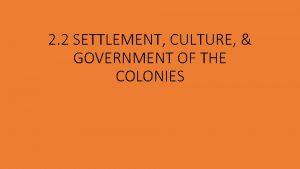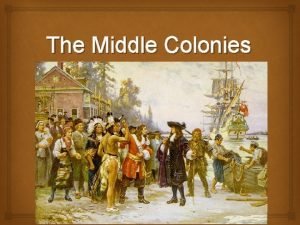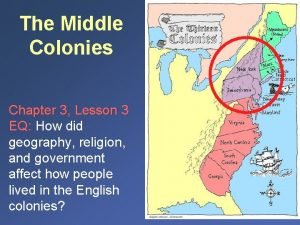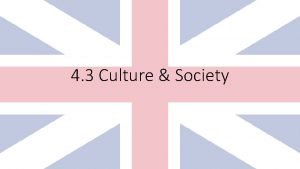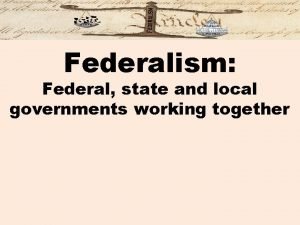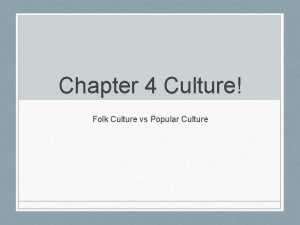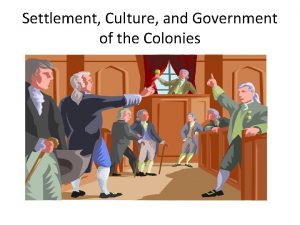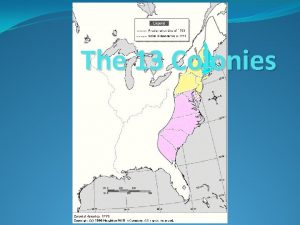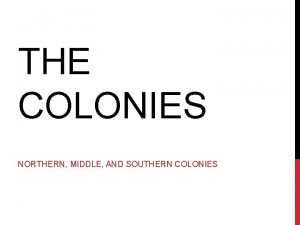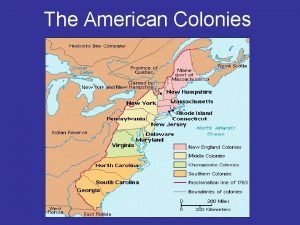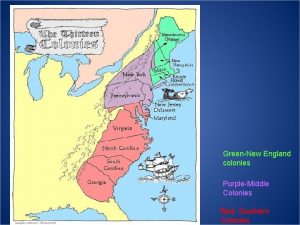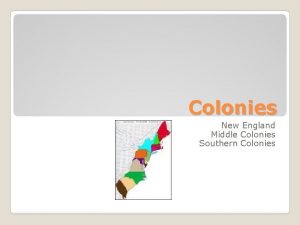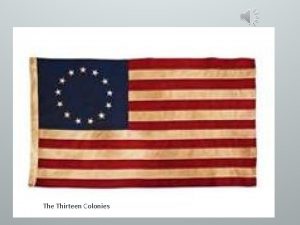2 2 SETTLEMENT CULTURE GOVERNMENT OF THE COLONIES









- Slides: 9

2. 2 SETTLEMENT, CULTURE, & GOVERNMENT OF THE COLONIES

SETTLING THE ENGLISH COLONIES • Many settlers came to America for economic reasons. • America offered land for farming. • Those who could not pay for the trip became indentured servants. • Indentured Servants: a worker who contracted with American colonists for food and shelter in return for his or her labor. (4 to 7 years)

RELIGIOUS FREEDOM • Other people came to the colonies to escape religious persecution. • Puritans founded Massachusetts for this reason. • Puritans were religious dissenters or people who opposes official or commonly held views.


COLONIAL LIFE- NEW ENGLAND • Massachusetts, New Hampshire, Connecticut, & Rhode Island made up the New England Colonies. • Most colonist lived in towns and large scale farming was difficult. • Most worked in towns. Shopkeepers, shipbuilding, & fishing. • Many in New England were Puritians.

THE MIDDLE COLONIES • New York, New Jersey, Delaware were located south of New England. • Farmers raised wheat and other cash crops. • Cash Crops: a crop produced mainly for sale. • The Middle Colonies were also rich in natural resources. (Sawmills, mines, ironworks) • The colonists here depended on resources such as lumber, metals, and natural harbors.

THE SOUTHERN COLONIES • Maryland, Virginia, North Carolina, South Carolina, and Georgia. • A warm climate, long growing season, and rich soil made large-scale agriculture successful. • Plantations or large farms/estates developed on the coast. • At first indentured servants did much or the work but over time, slaves were used.

COLONIAL GOVERNMENT • In the 1650’s, Parliament began passing laws to regulate the colony's trade. • King of England appointed governors to enforce the laws. • Local laws were still passed by the colony’s elected assembly.

CHANGE • As time passes, colonists’ assemblies grew stronger. • By the 1700’s, the colonies were used to governing themselves through elected legislatures. • Many began to agree with John Locke’s way of thinking. • People began to resent the British control over the colonies.
 Lesson 2 settlement culture and government of the colonies
Lesson 2 settlement culture and government of the colonies Government of the middle colonies
Government of the middle colonies Who founded pa
Who founded pa Southern colonies society/culture
Southern colonies society/culture What are the three levels of government
What are the three levels of government Stab culture and stroke culture
Stab culture and stroke culture What is folk culture
What is folk culture Batch culture vs continuous culture
Batch culture vs continuous culture Carpet culture microbiology
Carpet culture microbiology Uses of selenite f broth
Uses of selenite f broth
